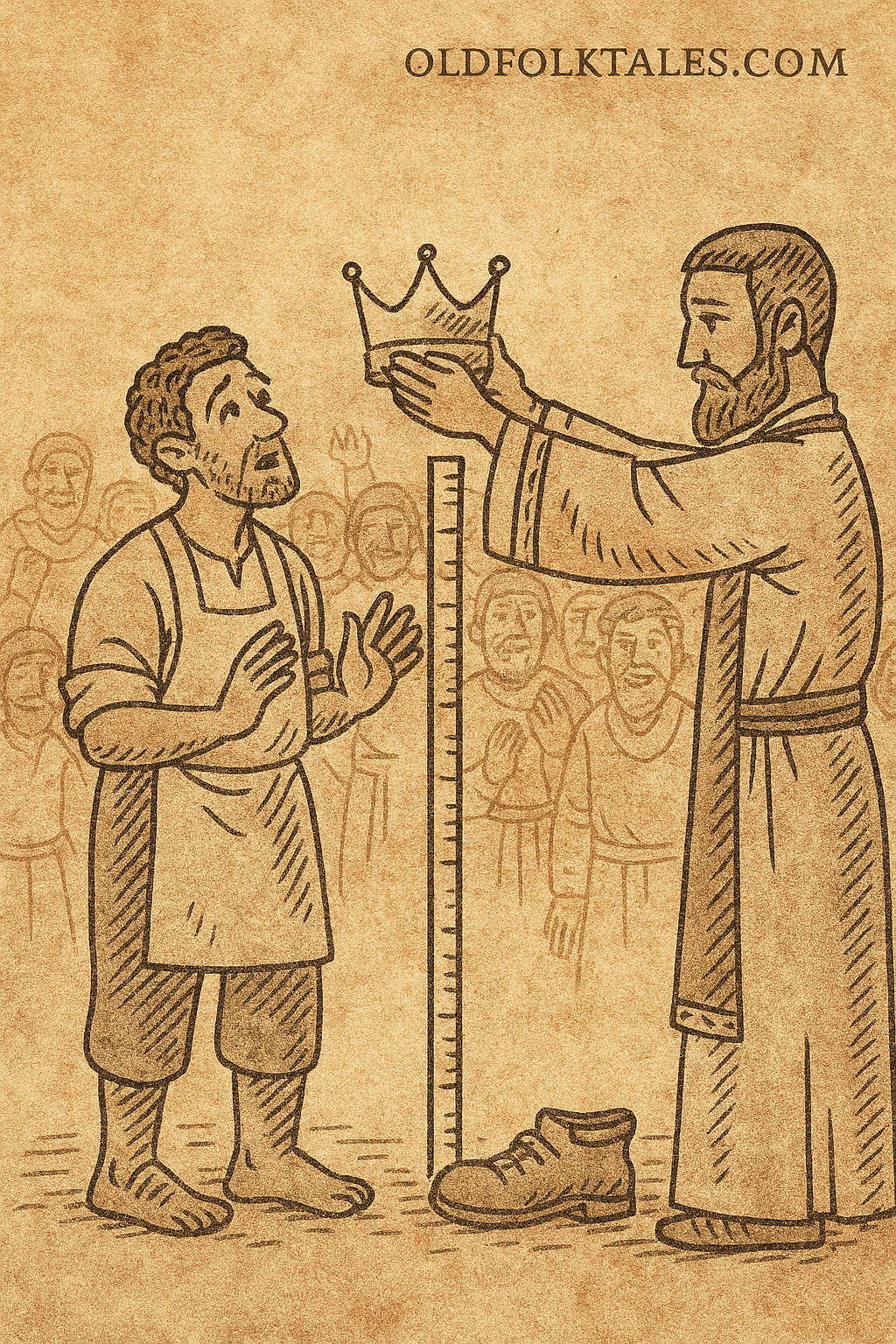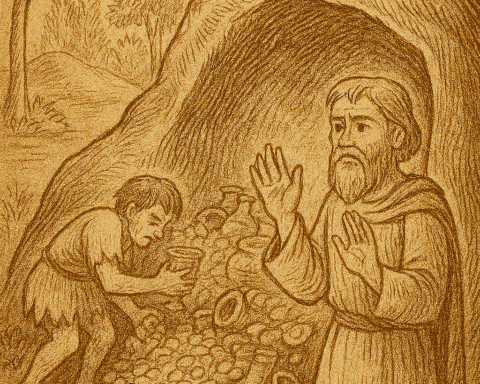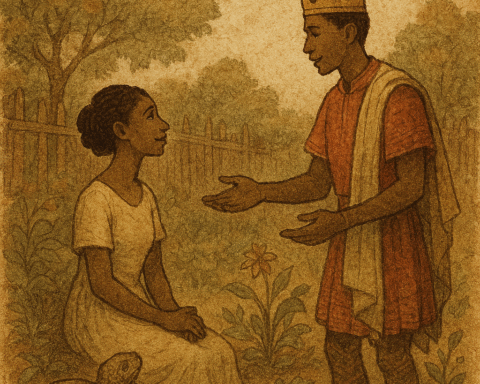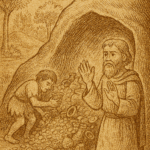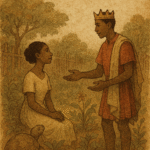In a kingdom nestled between emerald hills and silver streams, there existed a tradition unlike any other realm in the known world. Where other lands crowned their rulers based on noble bloodlines that stretched back generations, or vast treasures that could buy armies, or mighty sword arms that could cleave through enemies like wheat before the scythe, this kingdom followed a different path entirely. Here, the crown passed not to the richest or the strongest, but to the man who stood at precisely the height decreed by ancient law a measurement carved in stone by their founding fathers and guarded as sacred truth.
The royal decree was both simple and absolute: too tall, and you were deemed unfit to rule; too short, and the crown would never grace your head. Only the man who matched the sacred measurement exactly could claim the throne. It was a strange custom that had puzzled neighboring kingdoms for centuries, yet it had served this land well, producing rulers who seemed to possess an almost mystical connection to their people’s needs.
In the winding cobblestone streets of the kingdom’s heart lived a humble shoemaker whose calloused hands had never known the touch of silk or gold. His small workshop sat tucked between a baker’s warm ovens and a blacksmith’s ringing anvil, where the scent of leather and the sound of his careful hammer created a rhythm as steady as his heartbeat. Day after day, he bent over his workbench, crafting sandals and boots with such precision that people would travel from distant villages just to have their feet measured by his knowing eyes.
Also read: The Two Brothers and the Magic Cave
The shoemaker possessed a gift that went beyond mere craftsmanship he could look at a person’s stride, study the wear patterns on their old shoes, and create footwear that seemed to have grown naturally from their very bones. His customers would leave his shop walking taller, their steps lighter, as if he had given them not just shoes but confidence itself. Yet despite this remarkable talent, he had never once dreamed of greatness beyond his leather-scented workshop.
When news spread through the kingdom that their beloved old king had breathed his last, the familiar ritual began once more. The great square, normally filled with merchants hawking their wares and children playing tag between the fountain stones, transformed into a sea of hopeful faces. Men arrived from every corner of the realm, wealthy merchants in fine robes, battle-scarred warriors with proud bearing, learned scholars with ink-stained fingers, and ambitious nobles whose family crests gleamed on their chest plates.
The royal measurer, a solemn man whose family had performed this sacred duty for ten generations, stood beside the ancient measuring rod. This staff of polished oak, embedded with precious stones that caught the sunlight like captured rainbows, had crowned seventeen kings and sent away countless hopefuls. One by one, the candidates stepped forward, their hearts pounding with dreams of power and glory.
The first man, a towering lord whose shoulders could have carried oxen, stepped up with supreme confidence. But when the measuring rod touched his head, it revealed what his proud bearing could not hide, he stood a full hand’s breadth too tall. The crowd murmured as he was dismissed, his face flushing red with disappointment.
Next came a wealthy merchant, his rings catching the light as he reached for greatness. But the sacred rod showed him lacking, too short by several inches to claim the crown. His gold could buy many things, but it could not purchase the height demanded by tradition.
Through the long afternoon, man after man faced the measuring rod. Some came achingly close, missing the mark by mere finger-widths that might as well have been chasms. Others fell so far short or exceeded the requirement so dramatically that their hopes crumbled before the rod even touched their heads. The crowd grew restless as the sun began its descent toward evening, and still no suitable king had been found.
The shoemaker had come to the square not as a candidate but as a curious observer, standing at the crowd’s edge with leather-stained apron still tied around his waist. His weathered hands, permanently darkened by years of working with dyes and oils, fidgeted nervously as he watched dream after dream shatter against the immovable standard of the ancient law.
Then, as the royal measurer began to look worried and the crowd started murmuring about an unprecedented crisis, a voice rang out from somewhere in the throng.
“What about the shoemaker?” someone called. “Has anyone measured him?”
All eyes turned toward the humble craftsman, who immediately began backing away, his face pale with shock. “Me?” he stammered, his voice barely above a whisper. “Surely you jest. I am nothing but a poor shoemaker, a man whose hands are forever stained with leather dye. These fingers that smell of cobbler’s wax are not fit to touch a golden crown, let alone wear one.”
But the crowd, desperate and curious, would not be denied. Strong hands reached out and gently but firmly guided the protesting shoemaker toward the measuring rod. His heart hammered against his ribs like a caged bird as he found himself standing before the solemn measurer, surrounded by hundreds of expectant faces.
The royal measurer raised the ancient rod with practiced ceremony, his movements slow and deliberate as befitted this most sacred of rituals. The crowd held its collective breath as the polished oak descended toward the shoemaker’s head.
When the rod came to rest, settling perfectly level, a moment of absolute silence stretched across the square. Then, like a dam bursting, a tremendous roar of joy erupted from every throat. “Here is our king!” they shouted, their voices echoing off the surrounding buildings. “The crown has found its rightful owner!”
The shoemaker stood frozen in disbelief, his knees trembling as the reality crashed over him like a cold wave. Before he could protest further, willing hands lifted the golden crown from its velvet cushion and placed it upon his work-worn head. The weight of it seemed to encompass not just gold and jewels, but the hopes and dreams of an entire kingdom.
In the days that followed, the nobles gathered in their perfumed halls to voice their displeasure. “How can a mere shoemaker sit upon the throne that has held kings?” they whispered behind jeweled fans. “What does he know of statecraft, of war, of the delicate dance of diplomacy?”
But as weeks turned to months, their protests grew quieter and eventually faded altogether. The shoemaker king, still rising before dawn as he always had, brought to his royal duties the same careful attention he had once devoted to crafting perfect shoes. He listened to petitioners with the same patience he had shown customers, measuring their needs as precisely as he had once measured feet.
Having lived his entire life among the common people, he understood their struggles in ways that no noble-born king ever could. When farmers complained of unfair taxes, he remembered his own lean seasons. When craftsmen spoke of unfair trade laws, he recalled the sting of competition from cheaper, inferior goods. He approached the kingdom’s problems like a master craftsman approaches a damaged shoe, carefully examining what was broken, then methodically repairing it with skill and patience.
Under his reign, the kingdom’s laws became as well-fitted to the people’s needs as his shoes had once been to their feet. He bound the realm together not with fear or force, but with justice and understanding, creating something stronger and more durable than any tyrant’s rule.
The Moral Lesson
This timeless tale teaches us that true leadership comes not from birthright, wealth, or physical might, but from character, humility, and the ability to understand and serve others. The shoemaker’s years of patient craftsmanship and genuine care for his customers prepared him to be exactly the right fit for his kingdom not just in measurement, but in heart and spirit. Sometimes the most unlikely candidates make the most effective leaders because they bring wisdom earned through humble service rather than inherited privilege.
Knowledge Check
Q1: What unusual method did this kingdom use to choose their kings? A: The kingdom chose kings by measuring every candidate’s height against a sacred rod. Only the man who stood at exactly the height decreed by ancient tradition could be crowned king those too tall or too short were dismissed.
Q2: What was the shoemaker’s special talent that made him respected in his community? A: The shoemaker had an extraordinary gift for creating perfectly fitted footwear. He could study a person’s stride and wear patterns to craft sandals and boots that seemed to have grown naturally on their feet, giving customers both comfort and confidence.
Q3: Why did the shoemaker initially resist being measured for kingship? A: He felt unworthy because of his humble social status and working-class background. He believed his hands, stained with leather dye and cobbler’s wax, were unfit to touch a golden crown, and that kingship was reserved for the noble and proud.
Q4: How did the shoemaker’s background help him become an effective king? A: Having lived among common people and experienced their struggles firsthand, he could understand their needs and problems in ways noble-born kings could not. His experience with patient craftsmanship also taught him to approach the kingdom’s problems methodically and carefully.
Q5: What does the measuring rod symbolize in this folktale? A: The measuring rod represents the idea that true fitness for leadership cannot be bought, inherited, or won through force. It symbolizes destiny and the notion that the right leader will be revealed through criteria beyond human ambition or social status.
Q6: What is the main theme of this traditional story about leadership? A: The story teaches that effective leadership comes from character, humility, and life experience rather than wealth, noble birth, or physical power. It demonstrates that sometimes the most unexpected candidates make the best leaders because they understand and genuinely care for their people.
Source: retold from The Multicolored diary
